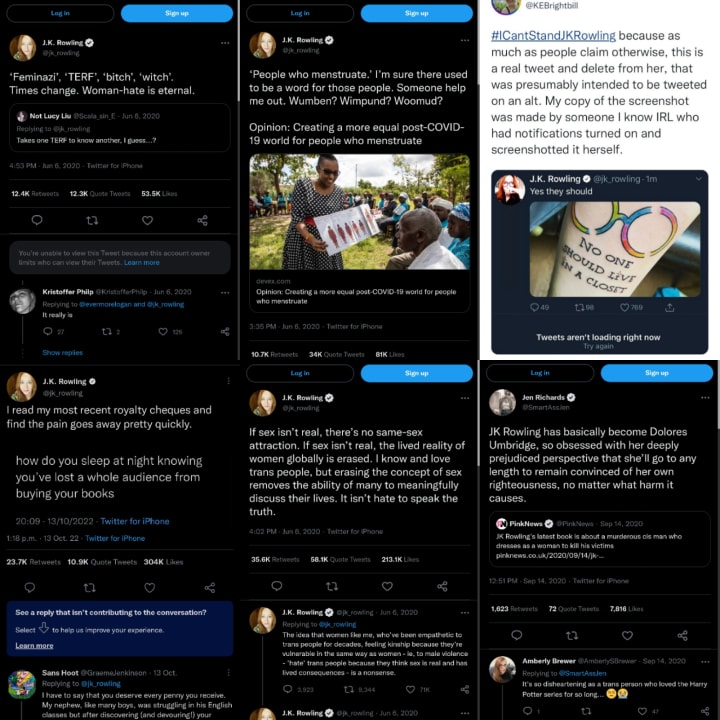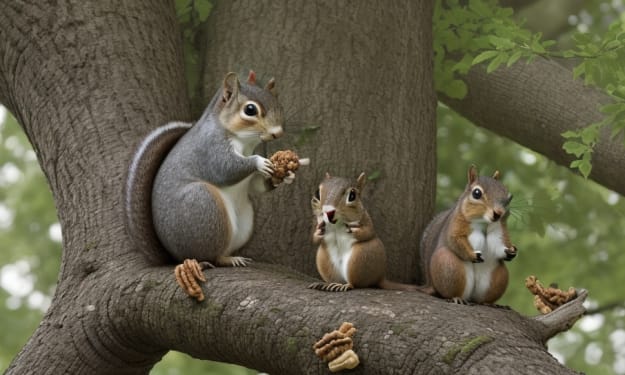Joanne Rowling & The Ink Black Heart
The more I learn about my "childhood hero", the sicker I feel.

This article contains mentions of transphobia, homophobia, and spoilers about the novel The Ink Black Heart.
------
Like many other people my age, I grew up with Harry Potter. It existed before I was born, and, like many loyal fans, I'd hoard the series: supporting the creator by buying merchandise, visiting theme parks, and going to see the movies when they were released. I remember finding solace in the community, and the characters, as if they were real friends of mine. In my teenage years, I'd spend far too much time writing fanfictions of the Harry Potter universe - which is embarrassing to admit now, but brought me comfort at the time. As a neurodivergent, mostly friendless person in middle and high school, reading was my escape: reading about people like me, people I related to, people I wanted to be like. Something as big as the Potter universe moulded my childhood, and gave me something to look forward to when I felt there was nothing else.
It's a little embarrassing to admit, now. I was always that kid who couldn't like things casually, and everybody knew this about me. When I found something I related to, I was all in: fully obsessed with it until I had no interest in it at all. In a way, the characters of the Potterverse were my best friends - because fictional characters can't judge you, and they never disappear. When I was eighteen, I had a Harry Potter themed birthday party. When I was twenty one, I went to a symphony and heard all the soundtrack music performed. Memories like this used to make me feel nostalgic. Meeting Harry Potter fans used to make me feel excited and included, and now it just makes me sad.
The thing about growing up is you learn, and you understand things that were too complex as a child. Part of my growth into adulthood meant rereading the books I loved as a kid, and looking at them in different ways. When it came to Harry Potter, there was a disturbing amount of problematic views within the series: such as the only Asian character being named Cho Chang, a Black man called Shacklebolt, and an anti-Semitic trope in the goblins who worked at Gringotts Bank. Despite all this, though, it isn't hard to overlook the underlying themes of the series, and to enjoy it for the message of friendship and courage that it holds.
In June 2020, J.K Rowling, author of the Harry Potter series, came under fire after expressing transphobic views on Twitter. She's a woman with a very large platform, with a potential to both ruin lives and save them with little effort at all. The fact of the matter remains - Harry Potter saved lives: the lives of friendless kids with nowhere else to turn, the lives of bullied kids who needed an escape, the lives of kids who were different. But with such a huge platform comes immense responsibility, and the chance of causing irreversible damage if used irresponsibly.
In childhood, the people we idolize often turn out to be completely different than we expected them to. This goes for people such as parents, siblings, mentors, even famous people whose work we enjoy. And of course, as it is with life: you can't be liked by everyone. It's a fact of being human. I know it better than anyone. This doesn't give a person, though, the right to hate speech, despite the idea that free speech exists. I mean, sure, free speech exists - but not if it puts the lives or safety of innocent people at risk.
As a transgender person with a social media presence, I know that people will threaten and harass me online. I've come to expect this, and to learn not to be bothered by it. A problem arises, though, when a very wealthy and famous woman with a very large following uses her platform for hateful and threatening speech against a very large minority (because, yes, millions of transgender people exist in the world, but we are still a minority, and will probably always remain that way).

There's a difference between ignorance and lack of knowledge. While one can certainly lead to the other, it's an easy fix: educate. As a white person, I have a lack of knowledge about the hardships and everyday lives of people of colour. As an able-bodied person, I have a lack of knowledge about the struggles disabled people face everyday. This is commonplace: we can't truly understand things we've never lived beyond a superficial level. I can educate myself on the lives of Black and disabled people by speaking to these people, or reading articles, or looking up history. Despite this, I'll never understand how it feels to be Black or disabled.
Joanne Rowling is a person who, despite her continued success, refuses to back down on her problematic views, and instead, insists on victimizing herself when stood up against. This is something I'd expect from a thirteen year old, not a middle-aged woman. It's not really a surprise, though. We all know the wealthy tend to be the worst types of people. I can't explain how it feels to know your lifelong hero despises your mere existence. I can't explain how it feels beyond just disappointment (and maybe betrayal, in a weird way). It's like discovering a lifelong friend loathes you suddenly, or turns out to be someone you really wouldn't want to be friends with after all.
Among the leftists and the Twitterverse, Rowling is a notorious TERF - that is: trans-exclusionary radical feminist. It's just what it sounds like, and Ms. Rowling is the textbook definition. The thing is, it's not feminism if you don't include trans women, sex workers, and women of colour. Otherwise, it's just plain bigotry. And in spite of having her bigotry pointed out multiple times, she buckles down on it, painting herself as the innocent victim of Internet trolls. Now, we can ignore her behaviour, or we can acknowledge it: and to be honest, I'm not sure which would be better. The gross truth about life is that the rich can get away with just about anything they'd like, because money talks, even when it shouldn't. Another thing: all publicity is good publicity. This means even if we speak up against J.K Rowling, and even if we don't, she will keep getting attention from the same types of people as herself.
In August 2022, a book called The Ink Black Heart, written under the pseudonym Robert Galbraith, was released worldwide. Robert Galbraith, the pen name of the infamous J.K Rowling, is a name used by two specific people: J.K Rowling herself, and an American psychiatrist infamous for his transphobia and homophobia. Let's get into it a bit more, shall we?
Robert Galbraith was a psychiatrist who followed the idea of biological psychiatry - therefore believing that transgender or other LGBTQIA+ people were the result of a mental illness which caused their existence to be curable. In 1950, Galbraith began the practice of deep-brain stimulation on schizophrenic patients, often forcing them into fatal seizures or brain abscesses. In addition to this, Galbraith claimed to have the ability to infect a non-schizophrenic patient by injecting them with the blood of a schizophrenic patient. Later in the 1950's, Galbraith began implanting electrodes into the brains of LGBTQIA+ patients before having them engage with sex workers as a way of medicating their illness. As a result of this, Galbraith claimed to have converted several gay patients to heterosexuality.

If you know the story behind J.K Rowling's pen name, everything becomes a little more appalling. It's a name she chose purposely subsequently to receiving hateful messages on death threats on social media in response to her transphobic and homophobic Tweets (perhaps in an attempt to be known for something other than her name, which was tainted by all this drama). The Ink Black Heart is a 1000+ page novel in a crime fiction series by Rowling. It follows a YouTube animator who's been targeted by her audience after posting a racist and transphobic cartoon - and who's later murdered by Internet trolls who deemed her politically incorrect. Sound familiar?
Rowling claims the plot of this book has nothing to do with the hate and attention she receives on Twitter, and even insists it was written before anything happened. In my opinion, it all sounds a little too similar to be a coincidence. It's been questioned why a publishing agency would publish a book with such a hateful backstory, especially the publishing agency of such a well-known author. That's the reason, though: she's well-known. No matter the content, or her bigotry, J.K makes money - which is exactly why she keeps getting published. She's a powerful person with the capability of putting the lives of trans and queer folks in danger, and more than a little interest in doing so.
About the Creator
ghostsandrebels
i'm a a queer writer, poet, cat lover, and author. i'm passionate about psychology, human rights, and creating places where lgbt+ youth and young adults feel safe, represented, and supported.
29 | m.
follow me on threads for more.






Comments
There are no comments for this story
Be the first to respond and start the conversation.